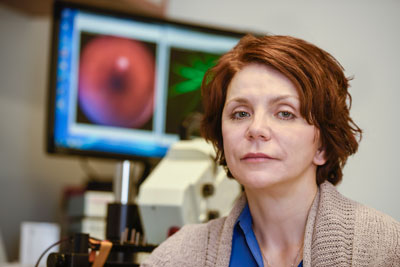A researcher at the UAB School of Optometry has been awarded a $1.25 million R01 grant from the National Eye Institute to study the regulation of protein synthesis in photoreceptors of mice with inherited retinal degeneration.
This research, led by Marina Gorbatyuk, PhD, associate professor of vision science, will not only lead to a better understanding of vision loss in humans, but will also promote the development of new strategies for stopping retinal degeneration.
Gorbatyuk's study will look at molecules that govern the rate of protein biosynthesis in the retina of mice mimicking human inherited retinal degeneration. Because of the expression of aberrant proteins in the biosynthesis that is present with retinal degeneration, the cells of the retina experience stress.
That chronic cellular stress activates an unfolded protein response in the photoreceptors and inhibits protein synthesis altogether. This ultimately results in vision loss.
Gorbatyuk plans to target and reprogram the response, which could slow photoreceptor cell death or even stop it.
"Despite significant progress in the basic science and clinical aspects of many retinopathies, the cellular mechanisms responsible for inherited vision loss require further investigation, and effective therapies are still under development," says Gorbatyuk. "To our knowledge, this is the first comprehensive study of translational regulation in healthy and diseased photoreceptors."
As a result of the study, targeted therapies could be developed to slow or stop vision loss.
"If successful, this study will not only enhance our molecular understanding of how degenerating photoreceptors die but also create a platform for therapeutic intervention to halt inherited retinal degeneration progression in humans," Gorbatyuk says.
Gorbatyuk received her doctoral degree in vision science from the Russian Institute of Biotechnology in Moscow. She moved to the United States in 1998 to complete a postdoctoral fellowship at the University of Florida, Gainsville. She served as assistant professor with the North Texas University Health Science Center until 2012, when she joined the UAB School of Optometry faculty.
This is Gorbatyuk's second R01 grant. The first, which was also a five-year grant, examined the activation of the unfolded protein response in mice with inherited retinal degeneration and validated therapeutic approaches based on cellular network reprogramming in degenerating photoreceptors.
